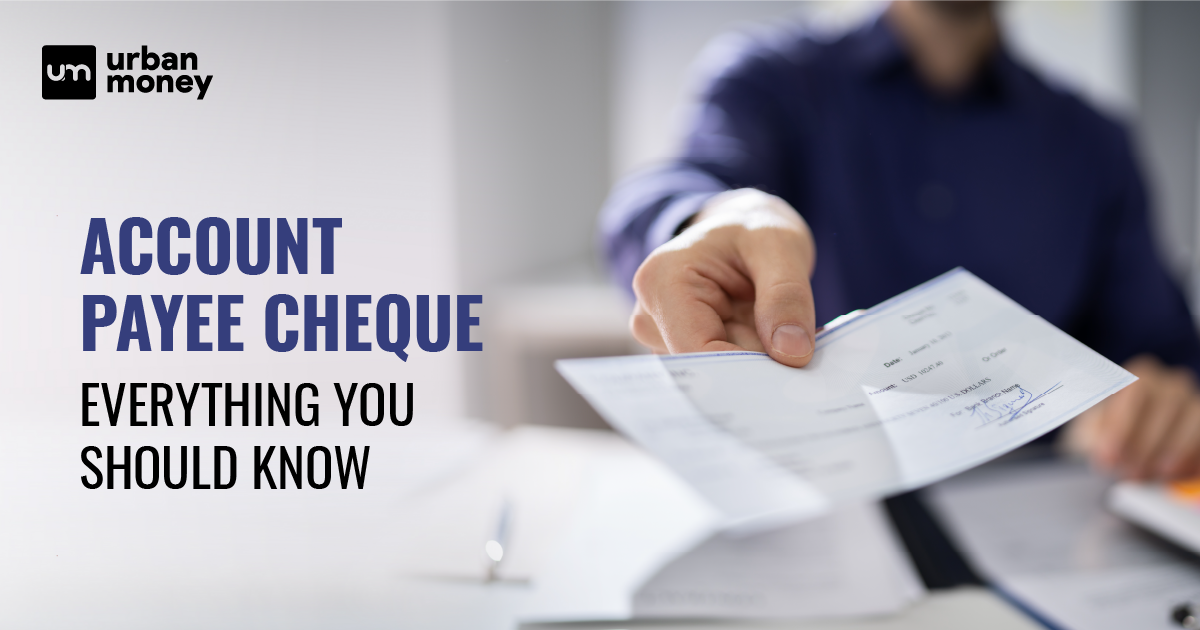Account Payee Cheque: How to Write, Encash and Fill

- Personalized solutions
- Expert guidance
- Application assistance
- Credit score discussion
- Interest rate comparison


Account payee cheques are a valuable tool in the world of banking and financial transactions, offering an added layer of security and precision. Designed to safeguard against fraud and unauthorised use, these cheques can only be deposited into the specified payee’s account, providing peace of mind for both parties involved.
With their ability to prevent cashing or endorsement by third parties, account payee cheques offer a reliable and trusted payment method, particularly when the payee may be unfamiliar or when conducting transactions in an online marketplace. Discover the benefits and intricacies of account payee cheques as we delve into their purpose, usage, and significance in ensuring secure and targeted payments.
How To Issue An Account Payee Cheque?
Here are the steps on how to issue an account payee cheque in India:
- Fill in the cheque. At the top right corner, write the date the cheque is being issued. In the “Pay” line, write the name of the person or entity the cheque is being made out of. In the next line, write the cheque amount in numerical form. In the line below that, write out the cheque amount in words.
- Cross the cheque. Draw two parallel lines across the top left-hand corner of the cheque.
- Write “Account Payee Only” between the two parallel lines.
- Sign the cheque. Sign your name in the signature field at the bottom of the cheque.
Here is the information that is required to issue an account payee cheque:
- The name of the person or entity that the cheque is being made out to
- The amount of the cheque
- The date on which the cheque is being issued
- The drawer’s signature
How To Deposit Or Encash A/C Payee Cheque?
Here are the steps on how to deposit or encash an A/C Payee Cheque:
- Endorse the cheque by signing on the back of the cheque.
- Visit your bank or financial institution with the cheque, identification, and account number.
- Fill out a deposit slip, including your account number and the cheque amount.
- Hand the cheque, deposit slip, and identification to the teller.
- Wait for the cheque to clear.
Terms Associated With Account Payee Cheque
- Payee: The person named on the cheque as the recipient of the funds.
- Drawer: The person who signs the cheque and is responsible for the funds.
- Crossing: Two parallel lines are drawn across the face of the cheque. This indicates that the cheque can only be deposited into a bank account.
- Endorsement: The signature of the payee on the back of the cheque. This authorises the bank to deposit the funds into the payee’s account.
- Clearing: The process by which a cheque is processed, and the funds are transferred from the drawer’s account to the payee’s account.
Differences Between Account Payee Cheque And Regular Cheque
- Account payee cheque: An account payee cheque is a type of cheque that can only be deposited into the account of the payee. It is a more secure form of payment than a regular cheque, as it cannot be endorsed and transferred to another person.
- Regular cheque: A regular cheque is a type of cheque that can be deposited into the account of the payee or endorsed and transferred to another person. It is less secure than an account payee cheque, but it is more convenient.
Benefits and Drawbacks Of Using Account Payee Cheques
Pros:
- Account payee cheques are more secure than regular cheques, as they cannot be endorsed and transferred to another person.
- Account payee cheques are a good way to make payments to people you do not know well or those not in your immediate vicinity.
- Account payee cheques are a good way to comply with government regulations that require payments to be made in a specific way.
Cons:
- Account payee cheques can be more expensive than regular cheques.
- Account payee cheques can be more time-consuming to process than regular cheques.
- All businesses and organisations may not accept account payee cheques.
Rules And Regulations For Account Payee Cheques
- Account payee cheques must be drawn from a bank in India. This is because the cheque must be processed through the Indian banking system.
- The payee must be a person or entity with a bank account in India. This is because the cheque must be deposited into the payee’s account.
- The cheque must be crossed. This means that the cheque can only be deposited into a bank account.
- The words “Account Payee Only” must be written across the face of the cheque. This prevents the cheque from being endorsed and transferred to another person.
- The cheque must be signed by the drawer. This is to authenticate the cheque.
- The payee must endorse the cheque. This is to authorise the bank to deposit the funds into the payee’s account.
- The cheque must be deposited into the payee’s account. This is the final step in the process of cashing an account payee cheque.
Note: If any of these rules are not followed, the bank may refuse to honour the cheque.
Differences Between Account Payee Cheques And Other Payment Methods
Account payee cheques are a type of cheque specifically designed to be deposited into the account of the person or entity to which the cheque is made. This type of cheque is different from a regular, or “open,” cheque, which can be cashed by anyone who holds it.
Here are some of the key differences between account payee cheques and other payment methods:
- Security: Account payee cheques are considered one of the most secure payment methods available. This is because they can only be deposited into the account of the payee, and they cannot be endorsed or transferred to another person.
- Speed: Account payee cheques can be processed and cleared quickly, which makes them a good option for payments that need to be made quickly.
- Cost: The cost of using account payee cheques varies from bank to bank. However, they are generally less expensive than other payment methods, such as wire transfers.
Here are some of the other available payment methods:
- Cash: Cash is the most common payment method, but it is also the least secure. This is because cash can be easily lost or stolen.
- Credit cards: Credit cards are a convenient and secure payment method. However, they can carry high-interest rates and be difficult to get approved for if you have bad credit.
- Debit cards: Debit cards are similar to credit cards, but they deduct the amount of the purchase directly from your bank account. This makes them a good option for people trying to budget their spending.
- Wire transfers: Wire transfers are a fast and secure way to send money internationally. However, they can be expensive, and they may not be available at all banks.
Conclusion
In conclusion, account payee cheques serve as a crucial tool for secure and targeted payments. By restricting the deposit and usage of the cheque to the designated payee’s account, they offer enhanced protection against fraud and unauthorised transactions. Whether used for unfamiliar transactions or in online marketplaces, account payee cheques provide peace of mind and ensure that payments reach their intended recipients.
With their clear instructions and endorsement requirements, these cheques enable individuals and businesses to navigate financial transactions while minimising risks confidently. Embracing the benefits of account payee cheques contributes to a safer and more reliable payment ecosystem.